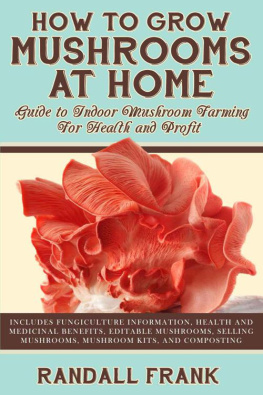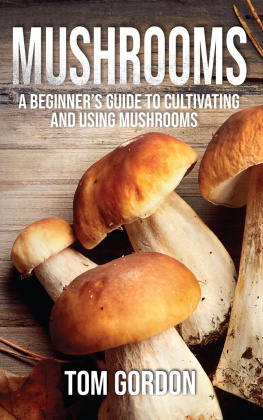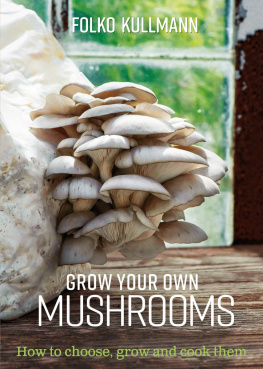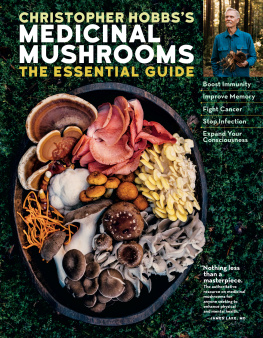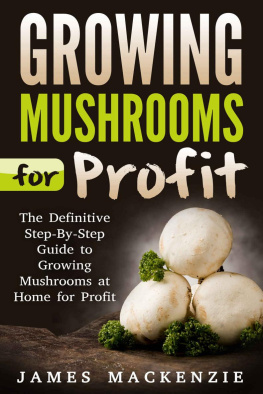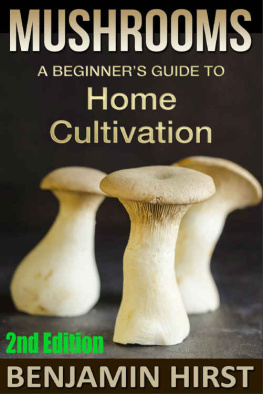How to Grow Mushrooms at Home
Guide to Indoor Mushroom Farming for Health and Profit
Includes fungiculture information, health and medicinal benefits, editable mushrooms, selling mushrooms, mushroom kits, and composting
By Randall Frank
How to Grow Mushrooms at Home
Guide to Indoor Mushroom Farming for Health and Profit
Author: Randall Frank
Published by: Homesteading Publishers, homesteadingpublishers.com
All rights reserved. No part of this book may be reproduced or transmitted in any form or by any means, electronic or mechanical, including photocopying, recording or by any information storage and retrieval system, without written permission from the author, except for the inclusion of brief quotations in a review.
ISBN: 978-1-927870-29-7
Copyright 2013 by Homesteading Publishers
First Edition, 2013
Published in Canada
Contents
Dedication
I would like to thank my immediate family for allowing me the freedom to experiment with trying to grow edible mushrooms over the years. It took me a while to find success, and when I did, I tried to get my father into this lucrative hobby. This book is dedicated to his memory.
Disclaimer
This book is designed to provide information on indoor mushroom growing only. This information is provided and sold with the knowledge that the publisher and author do not offer any legal, health, or other professional advice. In the case of a need for any such expertise consult with the appropriate professional. This book does not contain all information available on the subject. This book has not been created to be specific to any individuals or organizations situation or needs. Every effort has been made to make this book as accurate as possible. However, there may be typographical and or content errors. Therefore, this book should serve only as a general guide and not as the ultimate source of subject information. This book contains information that might be dated and is intended only to educate and entertain. The author and publisher shall have no liability or responsibility to any person or entity regarding any loss or damage incurred, or alleged to have incurred, directly or indirectly, by the information contained in this book. You hereby agree to be bound by this disclaimer or you may return this book within the guarantee time period for a full refund.
Foreword
Learn about how you can be a part of fungiculture and grow mushrooms at home for health and profit.
This book explains how mushrooms grow, how to grow mushrooms, what mushrooms to grow, and the amazing health benefits of eating certain types of mushrooms.
You will discover mushrooms are easy to grow and many have protein, B vitamins, minerals and some tout medicinal properties such as boosting the immune system, lowering cholesterol, and having a positive effect on certain cancers. In addition there are tips, methods, and insider techniques for growing mushrooms and marketing them.
Acknowledgements
When I returned to mushroom cultivation after some time away, there were many bloggers that inspired me with their creative shiitake mushroom growing. I would consider it "art" in some form, and I attempted to recreate it. My love of the hobby just grew from there. There are too many people to thank, and I don't want to risk leaving anyone out, so I will just say the bloggers and online forum contributors deserve most of the credit for this book being written. Without them, I wouldn't have shared as much knowledge to help get started producing mushrooms in a financially profitable manner while being environmentally sustainable.
1. Introduction to Mushrooms
"Nature alone is antique, and the oldest art a mushroom."
--Thomas Carlyle
Mushrooms are not a fruit or vegetable or even a plant. They are fruiting bodies of fungus or fungi (pronounced, "fun gee" or "fun guy".)
Fungiculture is the practice of producing food, medicine, and further products by cultivating mushrooms and additional fungi. Americans consume about 900 million pounds of mushrooms a year and most of those are the white button mushroom and, in the same family, the Cremini and Portobello mushrooms.
You can practice fungiculture or grow mushrooms for health and profit. They are fairly easy to grow and many have protein, B vitamins, minerals and some tout medicinal properties such as boosting the immune system, lowering cholesterol, and having a positive effect on breast cancer in women and prostate cancer in men.
There might be as many as 140,000 species of mushrooms. Only about ten per cent or 14,000 of them have been identified. Out of all those different kinds of mushrooms, only about 250 species are edible. Currently approximately 100 species of mushrooms are being researched for medicinal benefits.
The largest commercial producer of mushrooms in the world is China and then the United States where almost three fourths of U.S. mushrooms are grown on the east coast.
M USHROOMS ARE A S UPER F OOD
There is ample evidence supporting mushrooms as a "super food" packed with potent nutrition. Health conscious consumers prefer organically grown mushrooms to steer clear of any harmful contaminants and health experts recommend exclusively eating organically grown mushrooms. Mushrooms easily absorb elements from their growth environment, such as soil, air and water in concentrated quantities.
Mushrooms are rich with beneficial nutrition and low in fat, calories and cholesterol. There are 2 grams of protein, a healthy dose of potassium and three important B vitamins in an average serving. Mushrooms also contain selenium found in meats. That makes mushrooms an adequate selenium source for vegetarians.
Certain mushrooms are a diet staple of some people, while other species are more of a delicacy. The mounting knowledge of their health benefits has contributed to their growing popularity and demand.
People look for organically grown mushrooms due to the fact that mushrooms are porous and absorb good and bad elements from the air, water, and substrate where they are grown. They concentrate any heavy metals and pollutants present.
Ancient Chinese medicine discovered the health benefits of mushrooms thousands of years ago including their aid in boosting immunity. The human make up is closely related to fungi as we share the equivalent pathogens, or bacteria and viruses. The antibiotics developed by fungi to protect themselves against bacteria are also effective for us. Some examples include penicillin, streptomycin, and tetracycline.
Numerous studies have shown varied health benefits of a variety of mushrooms. One such study showed that regular mushroom consumption was directly related to better nutrition. Eating dried white button mushroom extract is the same as taking vitamin D2 or D3 supplements. This mushroom also contains protein, enzymes, B vitamins, and vitamin D2.
Mushrooms are low calorie and great sources of antioxidants, including polyphenols and selenium, as well as antioxidants unique to mushrooms, such as ergothioneine.
Another study found that substituting red meat with white button mushrooms can assist in losing weight.
In addition to the culinary uses of mushrooms, people take mushroom supplements. There are basically two types of mushroom supplements.
Mushroom Concentrates and Extracts
In order to get these extracts, the mushroom mycelia or fruit body is placed in boiling water for some time to remove the long chain polysaccharides. What you are left with is a concentrated form of glycol-nutrients or complex sugars. These are where the mushrooms health benefits are thought to be and can often be found in capsule form.
Raw or Whole Food Mushrooms
These supplements are in the form of a powdered pill and generally taken by people striving to maintain optimal health.
Next page
